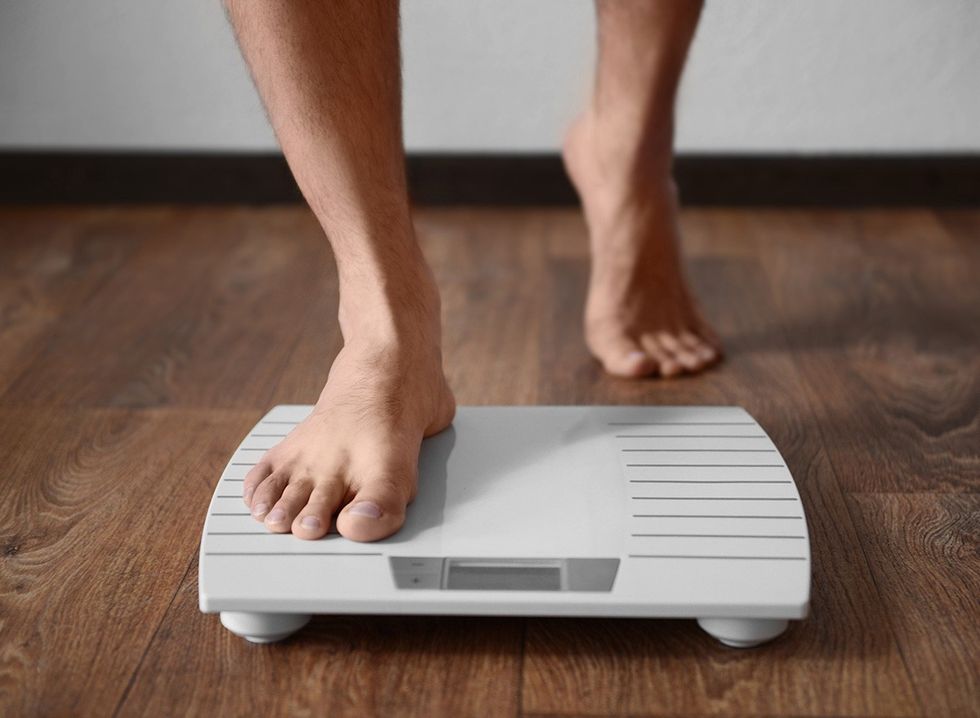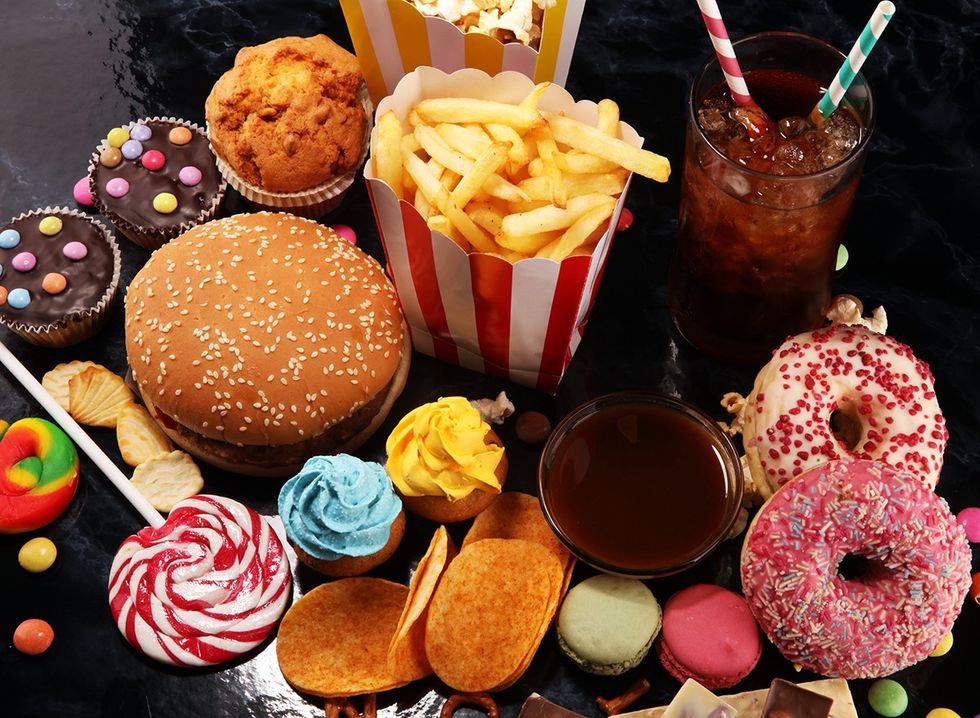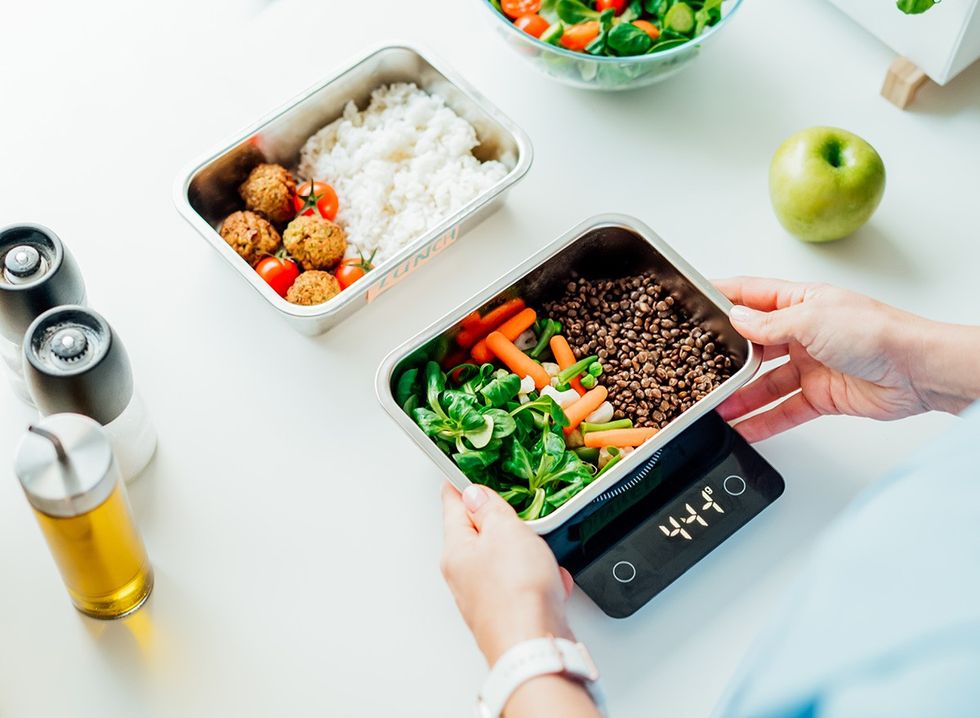Is weight loss just not happening, even if you’re seemingly doing everything right? “The reason for gaining weight isn't always a mystery,” says Harvard Health. “For example, you might know you've been eating more and exercising less, a potent combo that often results in extra pounds. But sometimes the cause isn't quite so obvious. And you might not be aware of many of the other factors that can contribute to weight gain.” Here are 20 habits that could be derailing your weight loss.
Poor Sleep

Not getting at least seven hours of sleep can derail your weight loss efforts. “Research shows inadequate sleep can lead to weight gain,” says Harvard Health. “Most people need about eight hours of sleep a night, but there's a lot of variability — some people need more, some less. You can tell if you're getting enough sleep if you wake up feeling refreshed and ready to go rather than groggy and grouchy.”
Unaware of Calories

You have to burn off more calories than you’re taking in for weight loss to happen. “Carbohydrates, fats, and proteins are the types of nutrients that have calories and are the main energy sources for your body,” says the Mayo Clinic. “No matter where they come from, the calories you eat are either converted to physical energy or stored within your body as fat.”
Too Much Stress

Stress can undermine your weight loss efforts. “Chronic and uncontrollable stress can undermine your efforts to eat healthy, exercise, sleep, and develop healthy habits,” says USCG. “And unhealthy weight-loss patterns usually intensify the stress.”
Sedentary Lifestyle

Sitting all day is linked to excess fat, especially around the abdomen. “Exercise can help reduce your waist circumference,” says Harvard Health. “Even if you don't lose weight, you lose visceral belly fat and gain muscle mass. Engage in at least 30 minutes of moderate-intensity activity most days, such as brisk walking or bicycling at a casual pace.”
Too Much Alcohol

Drinking too much alcohol can disrupt fat-burning and prevent weight loss from happening. “The best way to control calories from drinking is to limit how much you drink,” says Mount Sinai. “Before you go out, set a limit for yourself and stick with it. It is OK to turn down a drink you do not want or refuse a top-off on your wine glass. You can skip drinking altogether and volunteer to be the designated driver.”
Eating Late At Night

Snacking late at night is not good for your health or your waistline. “Eating later can promote a negative profile of weight, energy, and hormone markers—such as higher glucose and insulin, which are implicated in diabetes, and cholesterol and triglycerides, which are linked with cardiovascular problems and other health conditions,” Namni Goel, PhD, tells Penn Medicine News.
Not Enough Protein

Eating enough protein is important for weight loss. “Protein is invaluable when it comes to increased fullness and satisfaction after a meal,” registered dietitian Annalise Pratt, RD, tells the Cleveland Clinic. “Knowing how to use this key nutrient as part of a balanced diet puts the odds of losing weight on your side.”
Too Much Sugar

Too much added sugar (for example, in ultra-processed foods) can derail weight loss. “Added sugars go by a lot of different names like brown sugar, corn sweetener, corn syrup, dextrose, fructose, glucose, high-fructose corn syrup, honey, invert sugar, lactose, malt syrup, maltose, molasses, raw sugar, sucrose, trehalose, and turbinado sugar,” says the Office of Disease Prevention and Health Promotion.
Too Much Junk Food

Junk food is bad for your health but is especially toxic when it comes to weight loss. Not only does fast food tend to be very high in calories, it also is low in nutritional benefits and packed with sodium, trans fats, and additives.
Over Exercising

Over-exercising can backfire when it comes to weight loss. How? Spiking cortisol encourages weight gain. Sometimes, less is more.
Yo-Yo Dieting

Jumping on the next fad diet bandwagon only to jump on something else a week later is counterproductive for weight loss. Stick to a diet you can enjoy long-term, like the Mediterranean diet.
Eating On the Go

Eating while distracted can cause weight gain in different ways. If you’re eating in front of a screen or while commuting, it’s harder to listen to your fullness/hunger cues. Try to sit down and focus on your food, even if it’s just a snack.
Too Much Processed Foods

Processed foods, even if they are vegan, organic, grass-fed, or anything else “healthy,” are bad for your health and your weight. Ultra-processed foods are usually packed with unhealthy ingredients and preservatives. Stick to whole foods and minimally-processed foods as much as possible.
RELATED: 20 Signs That Your Workout Routine Is Actually Burning Fat
Skipping Meals

Unless you are consciously intermittent fasting, skipping meals is not a good idea. “Many people skip breakfast because they're too rushed or they aren't hungry,” says Harvard Health. “Try getting up 15 minutes earlier (which means going to bed earlier so you don't sacrifice sleep time) to make time for breakfast and practice putting down your utensil or sipping water, coffee, or tea between bites.”
Eating Out

Cooking at home gives you full control over how much you eat and what exactly is in your food. By prepping all your meals and snacks, you don’t have to rely on unhealthy choices outside. Cooking at home most of the time means you avoid the risk of consuming unhealthy ingredients.
Not Hydrating

Water is important for weight loss. By drinking plenty of water, you may feel less hungry, plus water has no calories. Get used to drinking lots of water and avoiding sugary sodas and other calorific drinks.
RELATED: Top 9 Vitamin Deficiencies and How to Spot Them
Drinking Your Calories

Speaking of drinking your calories… try not to do it. Consume your food whole to get all the benefits of fiber, which would be lost with juicing. Avoid sodas, even ones with artificial sweeteners, as studies show they contribute to weight gain.
Unrealistic Goals

Trying to do too much too fast can backfire. “Perhaps you'd like to be the same size you were in high school or when you got married, but that would mean dropping more than 50 pounds. Don't go there — not yet, at least,” says Harvard Health. “Set a more realistic goal of losing 5% to 10% of your weight, and give yourself plenty of time and some flexibility to reach that goal, keeping in mind that most people take at least six months to achieve that degree of weight loss.”
Fear Of Bulking Up

Do you avoid lifting weights because you’re afraid to get too much muscle? It’s almost impossible to do that by accident, and lifting weights encourages fat-burning even when you’re not working out. Don’t be afraid of weights!
RELATED: Jillian Michaels Reveals the Secret to Blasting Belly Fat
Getting Bored

Find a weight loss routine that keeps you interested. “Try a new form of exercise. Swim laps at a local pool; go dancing; play Frisbee,” says Harvard Health. “Finding a form of exercise that you really enjoy will make it easier to stick to an exercise routine — and incorporating new types of exercise can keep you challenged and less likely to become bored.” And if you enjoyed this article, take advantage of these 15 Quick Ways to Lose Body Fat Percentage in a Week.









 Shutterstock
Shutterstock Shutterstock
Shutterstock Grass-Fed Beef: The Satisfaction SolutionShutterstock
Grass-Fed Beef: The Satisfaction SolutionShutterstock Shutterstock
Shutterstock Shutterstock
Shutterstock Shutterstock
Shutterstock Store-Bought Chips: Your Daily Diet DestroyerShutterstock
Store-Bought Chips: Your Daily Diet DestroyerShutterstock Shutterstock
Shutterstock









 Shutterstock
Shutterstock Shutterstock
Shutterstock Shutterstock
Shutterstock Shutterstock
Shutterstock Shutterstock
Shutterstock Shutterstock
Shutterstock Shutterstock
Shutterstock Shutterstock
Shutterstock Shutterstock
Shutterstock Shutterstock
Shutterstock Shutterstock
Shutterstock Shutterstock
Shutterstock Shutterstock
Shutterstock Shutterstock
Shutterstock Shutterstock
Shutterstock Shutterstock
Shutterstock Shutterstock
Shutterstock Shutterstock
Shutterstock

 I'm a Nutritionist and These 9 High-Protein Snacks Keep My Clients Full While Losing 50 Pounds
I'm a Nutritionist and These 9 High-Protein Snacks Keep My Clients Full While Losing 50 Pounds
 Shutterstock
Shutterstock 2. Processed FoodsShutterstock
2. Processed FoodsShutterstock Shutterstock
Shutterstock Shutterstock/Prostock-studio
Shutterstock/Prostock-studio Shutterstock
Shutterstock Pro TipsShutterstock
Pro TipsShutterstock Shutterstock
Shutterstock Shutterstock
Shutterstock Shutterstock
Shutterstock Don’t Drink as Much AlcoholShutterstock
Don’t Drink as Much AlcoholShutterstock Most Women on GLP-1s Are Making a Few Common MistakesShutterstock
Most Women on GLP-1s Are Making a Few Common MistakesShutterstock Soda and Sugary DrinksShutterstock
Soda and Sugary DrinksShutterstock Shutterstock
Shutterstock Eat BreakfastShutterstock
Eat BreakfastShutterstock And Improve Insulin SensitivityShutterstock
And Improve Insulin SensitivityShutterstock Belly Flab Strip Tip: Sugar and Fat Calories Leave Its Mark on Your BodyShutterstock
Belly Flab Strip Tip: Sugar and Fat Calories Leave Its Mark on Your BodyShutterstock Shutterstock
Shutterstock The Drugs Mimic the GLP-1 Hormone Naturally Produced by the BodyShutterstock
The Drugs Mimic the GLP-1 Hormone Naturally Produced by the BodyShutterstock 3. Deep-Fried ItemsShutterstock
3. Deep-Fried ItemsShutterstock